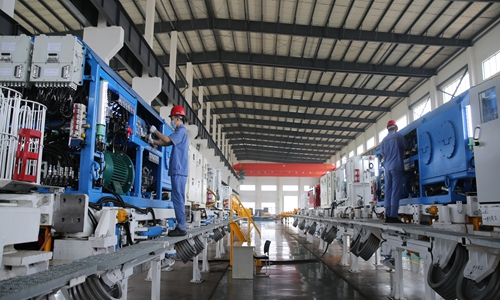Manufacturers meet growing demand via e-commerce
Chinese exports of refrigerators soared amid the global pandemic, as overseas customers rushed to stockpile food due to the COVID-19 outbreak threatening supply chains and citizens avoiding going out.
On Alibaba-backed AliExpress, a leading B2C cross-border e-commerce platform in China, recent sales of refrigerators skyrocketed 700 percent year-on-year in Spain, the platform said in a press release sent to the Global Times on Saturday.
“One of the major reasons for the soaring sales of refrigerators on our platform is European people’s growing need to store meat and vegetables amid tight supply caused by the COVID-19 outbreak,” said Du Man, an AliExpress employee engaged in the home appliance sector.
Seizing the opportunity, home appliance brands reported better year-on-year exports. China’s home appliance manufacturer Galanz reported a growth in sales across many countries and regions in the first five months of 2020, highlighting a 41 percent year-on-year growth in North America, according to an article posted on its website.
Manufacturing of overseas orders for several types of products has been planned until the fourth quarter, according to the company.
China’s “home appliance capital” Shunde, South China’s Guangdong Province exported $2.68 billion worth of home appliances in the first five months of this year, with exports of refrigerators up 15.4 percent year-on-year, data from the Shunde office of Guangzhou Customs District showed. In May alone, the city’s refrigerator exports skyrocketed 40 percent year-on-year.
Strong sales overseas are mainly thanks to the excellent cost performance and improvement in quality and industrial design of home appliances made in China – the world’s largest refrigerator supplier, Liang Zhenpeng, a senior Beijing-based industry analyst, told the Global Times on Sunday.
To expand production capacity for refrigerator export and adopt new manufacturing technologies, East China’s Anhui Province-based home appliance producer Changhong Meiling Co announced on June 29 that it will invest 20.21 million yuan ($2.89 million) in updating its production line to increase product competitiveness.
However, excellent Chinese products can’t reach overseas customers without proper sales channels, for which cross-border e-commerce platforms like AliExpress and DHgate.com play an important role, as more customers that are forced stay inside start to shop online, Liang noted.
Booming cross-border e-commerce
Cooperating with Alibaba’s logistics unit Cainiao, AliExpress has built four warehouses overseas, making quick delivery of large items like home appliances and furniture much easier.
“Like Chinese consumers at home, people in Spain can now enjoy 3-days-or-less fast delivery services by shopping on AliExpress,” said Wang Changhui, head of AliExpress’s office in Spain.
Not only serving customers overseas, these warehouses also provide infrastructure guarantees for Chinese brands looking to go global.
As large numbers of brick-and-mortar stores overseas were forced to temporarily shut down amid the global pandemic, East China’s Shandong Province-based appliance and electronics manufacturer Hisense announced in May its collaboration with AliExpress to directly reach foreign customers.
During a promotional event organized by AliExpress in March, Hisense saw a boost in sales of 50-inch and larger-screen TVs, increasing 1,066 percent month-on-month, providing the confidence needed to expand sales via e-commerce, according to the company.
Meanwhile, Chinese cross-border e-commerce platforms are also helping foreign traditional manufacturers go digital and boost sales. For example, DHgate.com helped a trading company with a significant number of face masks stored in a German warehouse to meet consumer needs in Germany, Italy, Spain and France through cross-border e-commerce at a high speed.
“Our DH FASTER service provides a faster delivery with overseas-stored products to enhance the customer experience and increase confidence. For example, the DH FASTER service guarantees that buyers in the US and the EU can get products within six working days,” the company told the Global Times.
A State Council meeting convened on June 28 urged domestic exporters to accelerate development of new business models, like cross-border e-commerce and online transactions, and to encourage the establishment of warehouses overseas in order to drive exports.
Along with the central government’s calls to stabilize exports, Northwest China’s Gansu Province has ramped up efforts to boost the establishment of a national cross-border e-commerce pilot zone since the beginning of 2020. In the first five months, the province’s imports and exports via cross-border e-commerce reached 67.15 million yuan, an increase of 15.8-fold year-on-year, becoming a new force in foreign trade, according to local government.
A production line of a machinery factory in East China’s Jiangsu Province on July 5, 2020 Photo: cnsphoto




